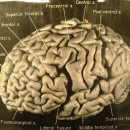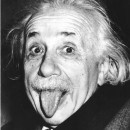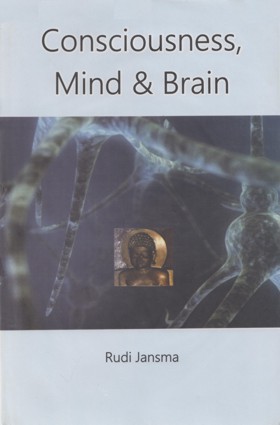Research has shown that human beings with sharply reduced brain volume (perhaps up to 90%), as can be the case in Hydrocephalus, can in exceptional cases function rather normally, though usually not always such patients are mentally retarded.


Apparently a limited amount of nerve cells and connections in a heavily distorted brain can do most of the work. One interesting case of hydrocephalus was a man whose cerebrum shrank to a thin sheet of tissue, due to buildup of cerebrospinal fluid in his skull. As a child, the man had had a shunt, but it was removed when he was 14. In July 2007, at age 44, he went to a hospital due to mild weakness in his left leg. When doctors learned of the man's medical history, they performed a computed tomography (CT) scan and magnetic resonance imaging (MRI) scan, and were astonished to see 'massive enlargement' of the lateral ventricles in the skull. Dr. Lionel Feuillet of L'Hôpital de la Timone in Marseille said, "The images were most unusual... the brain was virtually absent." Intelligence tests showed the patient had an IQ of 75, below the average score of 100. This would be considered 'borderline intellectual functioning', just above what would be officially considered mentally challenged. The patient was a married father of two children, and worked as a civil servant, leading an at least superficially normal life, despite having enlarged ventricles with a decreased volume of brain tissue. "What I find amazing to this day is how the brain can deal with something which you think should not be compatible with life", commented Dr. Max Muenke, a pediatric brain defect specialist at the National Human Genome Research Institute. "If something happens very slowly over quite some time, maybe over decades, the different parts of the brain take up functions that would normally be done by the part that is pushed to the side.[1]
Only a relatively small part of the brain is active in known fields. Yet, there exists no human being without a brain. And a human without a developed cerebrum would not be a human, even if he could perform all locomotor and physiological functions of an 'human' animal. What is the case in hydrocephalus is only that for some external reason an excess of fluid is accumulated, causing the brain material to be pressed aside against the skull. Of course this can cause lethal damage or non-lethal but severe damage, but in some cases the damage may be rather limited. Though the brain cells and centers are dislocated, they may still function normally as if they had been in their right location. Moreover the greater part of the mass of the brain does not exist of nerve cells, but of glial cells, which are cells that don't carry nerve impulses. (Glial means 'glue'). The various glial cells perform many important functions, including digestion of parts of dead neurons, manufacturing myelin for neurons, providing physical and nutritional support for neurons, and more. There are many types of glial cells including neuroglia ('nerve-glue') cells which guide neurons during fetal development. So there is nothing miraculous if the brain still works rather normal. It is just there, and functions. The location itself does not have to be of prime importance, as long as the connections between various regions can be maintained or reorganized in a workable way. In fact it is deceptive to say that such people have almost no brain.
Then, if we look from an occult scientific point of view, we know that humans after their death, and heavenly beings, including great scholars and highly developed people on earth, are in possession of mental capacities and memory when they have no physical body and no physical brains. 'Hells' and 'heavens' are states of consciousness which are created by the mind itself can, apart from their contents, also be divided on emotional grounds as 'pleasant' and 'unpleasant'; then we can assign epithets like 'heaven' and 'hell' to them which present themselves now before the consciousness of the deceased human being. So does the mind exist there without a brain? Is there a complete brain consisting of astral matter and if it does, why do we need a physical brain at all? Is a subtler brain as complex as the physical brain, and is it comparable (would it 'look like' a physical brain if we could see it?). Is it otherwise comparable to a physical brain in its more subtle form of matter? It is said that the body of desires (kāma-rūpa) is formed immediately after physical death and that within that form people may have more or less intense experiences of desire in the first period after their death. Innumerable indeed are the forms brought forth by the now disembodied mind.
If the kāma-lokic mind has the same brain complexity in the astral matter as the physical brain, it must have been formed by the physical brain during the latter's development, while all information about its structure as well as its experiences is copied to it. Without physical human experience with a brain and mental activity here on earth, there can be no experience of an afterlife consciousness that is a result of the most recent life on earth.
The astral worlds between death and rebirth, are however no causal spheres (karma bhūmis) they are worlds of experienced effects. The human being in the between-lives experience can, under normal circumstances, bring forth no new mental action, and thus can not create causes and there is no resulting karma. That is why we say that only our physical earth is a karma-bhūmi a 'work-planet', i.e. the only sphere where normal humans can create causes which will result in joy or suffering, and where one can cause spiritual progress or relative retardation.
For most western scientists these considerations would be like complete nonsense, garbage. Still there are innumerable reports of yogis leaving their bodies for considerable time, having experiences outside their body and then return. Also they can temporary 'borrow' the body of another human being who wishes to cooperate and stays aside during the experiment. There are uncountable reports about ghosts (bhūtas) who communicate with those living on earth, and convey information that they could impossibly know from others. Then there are reports of near-death-experiences, including cases (such as a particular form of meningitis) in which the cerebrum is totally non-functional. There are psychedelic drugs which trigger half-out-of-the-body experiences combined with hallucinations (some of which contain truths) due to distorted nervous brain functions, which can be perfectly remembered afterwards by the experimenters. Many ghosts as well as psychedelic experimenters report communication with other non-physical beings. People also report about states of consciousness that can not be described in human words, because the basis of understanding for our normal consciousness is totally absent in our physical mentality. No science studying mind and consciousness is complete when it can not satisfactorily explain and proof such phenomena.
The solution is rather clear: there are other phases of matter, and there are other sensory perceptions than physical sensory perception. Ultimately the spiritual monad in us has no human limitations and thus can experience all and know all than can be known in the universe. Some scriptures, such as for example the Tibetan Buddhist Bardo Thödol ('Tibetan Book of the Dead'), have discovered and described minute details about many different experiences between physical incarnations in which the limited mind is mirrored by its innate cause, the higher mind, and where choices will be semi-automatically, though, in full awareness, made according to one's power of spiritual recognition. This power of recognition is the actual evolutionary stage on the long human pilgrimage through many spheres and stages of evolution that the earthling has reached at the moment of the last death.


From Wikipedia: Hydrocephalus; sources: "Man with Almost No Brain Has Led Normal Life", Fox News (2007-07-25). Also see "Man with tiny brain shocks doctors", NewScientist.com (2007-07-20); "Tiny Brain, Normal Life", ScienceDaily (2007-07-24).; "Man Lives Normal Life Despite Having Abnormal Brain". The Globe and Mail. July 19, 2007. Archived from the original on August 28, 2007. Retrieved July 15, 2012. "Man with tiny brain shocks doctors". New Scientist and Reuters. 20 July 2007. Retrieved 8 June 2013. Feuillet, L; Dufour, H; Pelletier, J (Jul 21, 2007). "Brain of a white-collar worker". Lancet 370 (9583): 262. doi:10.1016/S0140-6736(07)61127-1. PMID 17658396
 Dr. Rudi Jansma
Dr. Rudi Jansma
